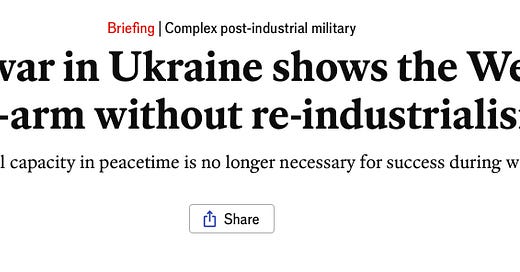Defense Support Means Industrialization
A belief that we don't need economic support for defense is ridiculous.
Maintaining a military requires a lot of supply and logistics. It's one of the parts of studying war, especially by amateurs, that many typically struggle with. It's not just by magic that an army in the field is able to function.
Even during peace time diverting economic production to ensure that you are prepared is very frequently a political hot topic. Most don't want to think that you might need to fight. This is frequently why many Western countries find themselves in complete disarray at the beginning of most conflicts. It's common to see readiness deteriorate over long periods of peace time.
One of the biggest problems a number of modern countries face, is even in peace time maintaining that level of supply for military action typically means a large industrial capacity. It's not hard to see why many of those who subscribe to globalist objectives, or left progressive views would find this difficult considering their general orientation. Do you really want a sizable chunk of the economy designed to propagate military support?
After all, most theories of global integration have relied on the idea that you can use international rules as an alternative. From that standpoint committing economic resources to maintaining a military doesn't make any sense.
And yet for all of this theorizing, war hasn't gone away. Maybe more troublesome to many is the real emergence of traditional warfare between two countries that appears to be making a resurgence. The end of the Cold War brought the return of traditional national issues to many global conflicts.
So does that mean maintaining industrial capacity for military operations has become a necessity for governments to think about. There's certainly those that would like to believe that it is not. Many who have been trying to restructure economies under the auspices of famous terms like the Great Reset or the NetZero economy are certainly struggling to figure out where this fits.
In fact for some trying to come to terms with the current Russia Ukraine conflict has become something of an amusing example.
The argument that Ukraine has been able to largely maintain its war effort without industrial capacity is ludicrous. Even though there are far fewer factories within its borders much of the war effort has been supplied by outside hardware. That is even though Ukraine doesn't have its own capacity, those in Europe in the United States do and have been filling that void.
In fact if anything the Ukraine war has in many respects reinforced that if you do require military hardware heavy industrial capacity is absolutely necessary. And at least part of the war effort's difficulties has arisen due to the lack of industrial capacity across broader Europe. Those calling for increased defense spending within NATO have been running into the problem of practicality. You have to expand the parts of the economy that support military operations.
How many times has the argument come up about the need for those supporting Ukraine in the conflict to give more aid either financially or more to the point in terms of military equipment. The very notion that you don't need industrial production is a willful fantasy.
This is another reason why those who view a globalist future have such a problem with Russia's actions. If border wars are still a thing and you are looking at a situation where different countries have different futures it means that economic consideration has to be given to maintaining militaries. Even if it's new technology like drones you're still talking about large scale manufacturing. This is completely counter to trying to integrate capacities as has been the desire of so many international organizations not that long ago.
This says nothing of those involved with most international organizations that also wanted to see economies become more green. Most current military manufacturing would still involve large amounts of carbon production. In short, the argument that defense spending needs to increase in light of Russia's actions as well as threats from other unfriendly countries runs against most environmental policy shifts. For those on the center left of the political spectrum it produces a quagmire of whether the environment can be sacrificed in light of this situation.
The traditional objection most social Democratic parties would have made to military spending was that it was a choice that would mitigate the resources available for social spending domestically. This is still the position that the Spanish government has taken with NATO's request for increased defense capacity. That one still comes up in some circles as well.
But the last 30 years has tried to frame the debate in such a way that militaries were increasingly becoming irrelevant as an inevitable certainty. An international rules-based order would replace the need for them. It's that these arguments have fallen under a cloud that so many would wish for or struggling with the idea that maintaining a defense economy is still something required in the modern world.
Like so much else that those that exist within the left progressive/globalist framework have argued for in the last 30 years, circumstances undermined their vision of a managed economy that didn't require a major defense industry. Trying to pivot away from that argument is posed almost impossible because it undermines so many of their basic presumptions about how global affairs were supposed to play out.
The problem is now there's too many that are trying to make two arguments that are incompatible at the same time. We need more defense spending in order to deal with countries like Russia. Even the left is making that point. And an aversion to industrial capacity being committed to that defense. Until somebody recognizes this contradiction and at least comes to a coherent policy proposition this is going to remain more of a theoretical debate than practical as far as anything coming of it.






